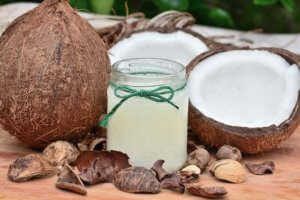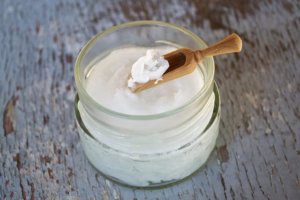Coconut oil has been all the rage for several years now.
Many people consider it to have near superfood status and view it as a healthy saturated-fat-alternative to animal-based fats. (It does have multiple documented health benefits that animal fats don’t share.) It has also featured in just about every DIY skin, hair, and body care recipe you can think of.
But if we take a closer, research-based look at coconut oil, does it live up to all the hype?
The answer— when it comes to your skin— is “yes” for the most part.
It does have to share the spotlight with other top plant-based oils like mango seed butter and pumpkin seed oil, but coconut oil holds its own and provides rich nourishment for your skin.
To give you an idea of all it can do, here’s a look at the best benefits of coconut oil for skin (including anti-aging properties!).
A Closer Look at Coconut Oil
Coconut oil is extracted from the meat or the kernel of coconuts. The end result is a thick whitish oil that is solid at room temperature but with a melting point of only 78°F. Even holding it in your hands for a minute or two is enough to melt a spoonful of the oil, which makes it very easy to use.
When it comes to extracting and processing coconut oil, there are two main methods.
The first is called dry processing. This method involves pressing the oil from dried coconut meat followed by bleaching and deodorizing processes. The end product is known as refined coconut oil, which has a somewhat neutral scent and a high smoke point.
Though refined coconut oil is the better choice for high-heat cooking, it is not the better choice for your skin because it loses a lot of nutrients during processing.
The second method is known as wet processing and uses raw coconut meat rather than dried. It creates unrefined or virgin coconut oil that has not been bleached or deodorized. This type of coconut oil retains much of its original coconut scent and nutrients, making it the best option for skincare.
What Are the Benefits of Coconut Oil?

The benefits of coconut oil for skin and health come from its unique makeup.
To begin with, coconut oil is incredibly rich in fatty acids. Most are in the form of medium-chain fatty acids (a type of saturated fat). Lauric acid is the dominant fatty acid, making up about 49% of the total fat content. Other notable fatty acids include myristic acid, caprylic acid, palmitic acid, capric acid, oleic acid, linoleic acid, and stearic acid.
Something that makes these medium-chain triglycerides (MCTs) special is that they are more difficult for your body to store as fat and easier to burn off than long-chain triglycerides (LCTs).
Along with a truly impressive variety of fatty acids, coconut oil contains powerful plant compounds, including antioxidants.
Antioxidants are key to slowing the aging process within your body, and coconuts are rich in multiple types: polyphenols, flavonoids, tocopherols, tocotrienols, and phytosterols. These all have benefits for your health and your skin (as you’ll soon see).
Top Benefits of Coconut Oil for Skin
Locks in Hydration & Smooths Out Skin
Coconut oil is particularly beneficial if you have dry skin because of its moisturizing properties. The fatty acids it contains provide it with rich, hydrating nourishment that can make an instant difference to your skin.
In technical terms, coconut oil really shines as an occlusive skincare ingredient.
Occlusives work by creating a barrier over your skin to prevent water loss and lock in hydration. They don’t actually provide extra moisture to your skin, so something like coconut oil is best used on damp skin or in combination with moisture-adding ingredients (like aloe vera).
In addition to acting as an occlusive, coconut oil also has emollient properties. This means it helps to fill in the “gaps” of dry skin with fatty acids, giving your skin a smoother, younger appearance.
For the most moisturizing and smoothing power, coconut oil is best used for a period of time. One study found that just two weeks of coconut oil application significantly improved skin hydration in a comparable way to mineral oil. Of course, coconut oil has the added benefit of not being a petroleum-based product!
Calms Inflammation & May Benefit Sensitive Skin

Studies have shown that not only are there benefits of coconut oil for skin inflammation, it can also ease internal inflammation when you consume it.
Researchers generally attribute these anti-inflammatory properties to the antioxidant content of coconut oil. This comes in part from a study that found polyphenols isolated from coconut oil were able to ease arthritis-related inflammation and symptoms.
Externally, coconut oil can be very effective for inflamed or red-looking skin. It has shown an ability to calm the inflammatory response in skin cells and has even demonstrated pain-relieving effects.
Other lab studies have found that coconut oil particularly helps with inflammation and irritation by enhancing skin barrier function. It was also found to be a “non skin irritant”, which suggests that unrefined coconut oil may be especially beneficial for sensitive skin.
To use coconut oil for angry skin, you can simply apply a small amount to the affected area or use a cream made with coconut oil.
Soothing for Various Skin Issues
Given the moisturizing, anti-inflammatory effects of coconut oil, it’s no surprise that it can help to calm certain skin issues.
Perhaps the best example of this is using coconut oil for eczema, which a few studies have found to be effective.
In one study, topically applied coconut oil was able to reduce the severity and symptoms of atopic dermatitis (a type of eczema) by about 68%. It proved to be much more effective than mineral oil, which only reduced severity by 38%.
Another study found similar results for adults with atopic dermatitis. There were benefits of coconut oil for skin dryness associated with eczema AND it showed antibacterial activity against Staphylococcus aureus, a bacteria that often worsens skin issues for eczema sufferers.
Unfortunately, there have been few to no quality studies on coconut oil and other skin issues. However, it certainly has the potential to help with many types of skin irritation, especially since it has been shown to promote skin barrier repair.
Has Antibacterial Properties that May Combat Acne

Acne is another skin condition that has been researched as far as coconut oil is concerned. And while coconut oil may not be the first ingredient that comes to mind for fighting acne, it has shown some surprisingly beneficial characteristics for breakout-prone skin.
At the top of the list are the anti-inflammatory properties of coconut oil, which we’ve already covered. Acne is, at its core, an inflammatory skin disorder, so calming this inflammation is key to getting breakouts under control.
Another key cause of acne for many people is bacteria on the skin. And not only has coconut oil been shown to possess antibacterial properties in general, it has also demonstrated activity against the specific bacteria that causes acne breakouts.
Much of the bacteria-fighting power of coconut oil comes from lauric acid, which makes up almost half of the fatty acid total. It has proven to be even more effective than benzoyl peroxide at inhibiting the growth of acne-causing bacteria in lab studies.
Other fatty acids in coconut oil have also shown anti-inflammatory and anti-bacterial activity.
However, it is important to note that most studies on coconut oil and acne have been conducted in a lab— not on human skin. In addition, coconut oil is a fairly heavy oil, making it not the best choice for those with already “congested” skin.
If you want to try it for yourself, use coconut oil on just a small area of skin to see whether it helps or worsens breakouts.
May Promote Wound Healing
One of the benefits of coconut oil for skin that has been especially promising is its potential ability to help with wound healing.
Wound healing is a complex process. It involves inner work to heal broken blood vessels, and surface-layer work to create new collagen fibers and skin tissues. Keeping pathogens, like bacteria, out of the wound is also essential to the healing process and preventing infection.
In preliminary studies, unrefined (virgin) coconut oil has shown an ability to speed the healing process, particularly by increasing collagen levels. It was also able to improve antioxidant status, which likely contributed to the wound-healing effects.
Another benefit of coconut oil for wounds is the antimicrobial properties it possesses.
You already know that it fights acne-causing bacteria, but it goes even further than that. The fatty acids within coconut oil have been shown to inhibit multiple strains of bacteria, including infectious strains, as well as certain fungi.
Now, this doesn’t mean you want to apply coconut oil to severe wounds, but it can be used as a quick “salve” for everyday cuts and scrapes.
Contains Protective Antioxidants

Antioxidants should be a major part of any skincare routine. They are critical for slowing the aging process in your skin because of their protective effects against free radical damage.
As you may know, free radicals are unstable molecules that can damage other molecules, cells, tissues, etc. within your body. In your skin, they play a role in degrading both collagen and elastin, which can be thought of as the two main anti-aging proteins.
Not only do antioxidants help combat free radicals in general, they particularly help with a certain type of damage known as photodamage. This refers to skin damage and signs of aging caused by overexposure to UV rays (aka sunlight), which is likely the #1 cause of premature skin aging today.
Coconut oil isn’t as high in antioxidants as some other natural ingredients, but it can still have an important place in anti-aging skincare. At least one study has shown that it can reduce inflammation associated with UVB exposure, likely due to the polyphenols present in the oil.
For the most benefits, pair coconut oil with other antioxidants like astaxanthin, vitamin C, or bakuchiol.
Is Coconut Oil for All Skin Types?
It’s clear that there are many significant benefits of coconut oil for skin. However, due to the nature of coconut oil, it may not be the best choice for all skin types.
In general, if you have oily skin or are prone to clogged pores and blackheads, pure coconut oil may not be right for you. This is because coconut oil is on the heavy side and is one of the most comedogenic (likely to clog pores) oils.
For some people, it appears to help with acne, while for others it may worsen breakouts. It’s really a process of trial and error to see which category you fall into.
All that being said, even those with oily skin, acne, etc. may still be able to use coconut oil IF it is blended with other ingredients. For example, your skin may do well with it in a product that combines it with lighter, non-comedogenic oils, non-oily plant extracts, and so on.
Ways to Use Coconut Oil for Your Skin

There are at least 101 ways to use coconut oil for skincare, but here are some of the top ideas:
- Rub into dry, cracked hands or feet
- Use as a body oil after showering
- Mix with sugar to make a simple body scrub
- Use a tiny amount as a natural makeup remover
- Rub into your cuticles
- Combine with essential oils to make a massage oil
- Add a tiny amount to your normal moisturizer
- Use in place of shaving cream
- Rub a small amount into dry scalp/hair
- Apply a thin layer over small cuts, sunburn, scars, etc.
Coconut Oil for Anti-Aging Skincare
If you want to get the powerful benefits of coconut oil in a complete skincare product, look into the Age-Defying Dream Cream from Purity Woods.
Coconut oil features as one of the top moisturizers in this 100% natural anti-aging formula. It combines with other antioxidant ingredients (including astaxanthin), premium hydrators, and pure botanical extracts to quickly erase the appearance of fine lines, wrinkles, saggy-looking skin, etc.
The Dream Cream is USDA Certified Organic (incredibly rare in a skincare product) and suitable for all skin types, including sensitive and oily skin.
Learn more about the Age-Defying Dream Cream here, and consider making coconut oil a part of your everyday skincare routine.


